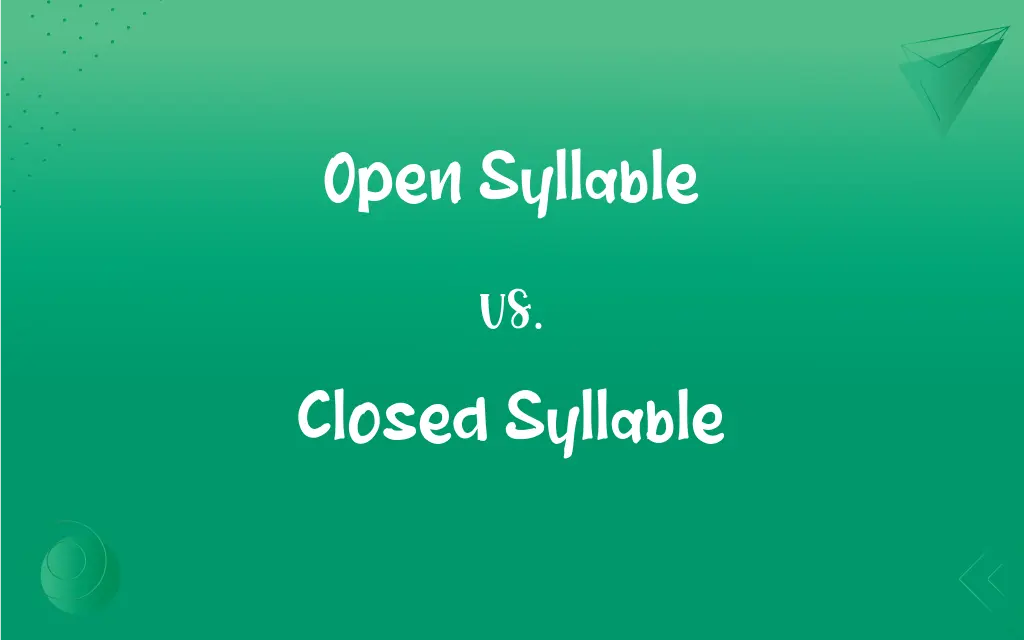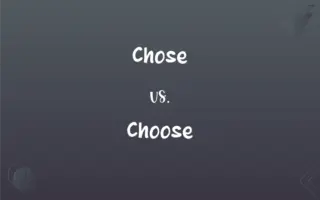Open Syllable vs. Closed Syllable: What's the Difference?
Edited by Aimie Carlson || By Harlon Moss || Updated on October 5, 2023
An open syllable ends in a vowel sound (e.g., pa-), while a closed syllable ends in a consonant sound (e.g., -pat).

Key Differences
An open syllable is defined by the manner in which it is articulated and concluded with a vowel sound, and notably, the vowel typically sounds as it is named. The open syllable provides an avenue in which words or their parts, by essentially not being “closed off” by a consonant, present a distinct elongation or prominence of the vowel sound. For example, in the word “pa-per,” “pa-” is an open syllable because it ends with the vowel 'a.'
On the other hand, a closed syllable is characterized by the terminating consonant sound, thereby enclosing or “closing” the vowel, often making the vowel sound short. The closed syllable presents a phonetic truncation, or perhaps a containment, of the vowel sound by not allowing it to spill over or elongate as the open syllable might. In contrast to the open syllable, consider the word "cat" where "-cat" is a closed syllable because it terminates with the consonant 't.'
When exploring open syllables, consider that their usage is imperative in the phonological constructs of languages, dictating a kind of rhythmic ebb and flow to the pronunciation of words. Open syllables influence pronunciation, making vowels say their name and allowing a rolling, uninterrupted transition from one syllable to the next in multisyllabic words. For example, “me-lo-dy” contains three open syllables.
Examining closed syllables, it becomes evident that their functionality provides a compact and decisive pronunciation of words or word segments, adding diversity to the phonetic landscape of a language. Closed syllables, by their very nature, add a crisp and abrupt edge to word segments, offering a counterbalance to the flowing nature of open syllables. Consider "pic-nic," where "-pic" and "-nic" are both closed syllables.
The way open and closed syllables influence language, especially in English, goes beyond mere pronunciation, impacting aspects such as spelling, phonetic variations, and even linguistic aesthetics. The open and closed syllables, working in tandem, allow for the varied and rich tapestry of sound within the English language, offering a broad spectrum from the melodious to the curt, and from the gentle to the striking, each serving their respective and crucial roles in verbal and written communication.
ADVERTISEMENT
Comparison Chart
Ending Sound
Vowel
Consonant
Vowel Sound
Long/Name of Vowel
Typically Short
Impact on Pronunciation
Often Smooth/Flowing
Can Be Abrupt/Definitive
Open Syllable and Closed Syllable Definitions
Open Syllable
A syllable that ends with a vowel sound.
The word “he” is an open syllable.
Closed Syllable
A syllable ending with a consonant sound.
The word “hat” is a closed syllable.
ADVERTISEMENT
Open Syllable
Can give a long, smooth sound to words.
“Se-cret” contains an initial open syllable.
Closed Syllable
Commonly found in monosyllabic words.
“Sit” is a closed syllable.
Open Syllable
A syllabic unit where the vowel says its name.
The first syllable in “pa-per” is open.
Closed Syllable
Tends to produce a shorter and more abrupt sound.
“Act” contains a closed syllable.
Open Syllable
A syllable that is not followed by a consonant.
“Ba-by” starts with an open syllable.
Closed Syllable
A syllabic unit often having a short vowel sound.
“Pic-nic” contains two closed syllables.
Open Syllable
Often found in the initial syllable of a word.
“O-pen” begins with an open syllable.
Closed Syllable
A syllable where the vowel is followed by a consonant.
“Graph” is a closed syllable.
FAQs
What impact does a closed syllable have on the following consonant?
A closed syllable doesn’t usually affect the following consonant, but impacts the vowel sound, often making it short.
What defines an open syllable?
An open syllable is defined by ending in a vowel sound.
What's a common word that features multiple closed syllables?
A common word like “internet” features multiple closed syllables: “in-ter-net.”
Is it possible for open and closed syllables to impact the meaning of a word?
Rarely, though it might not change the official definition, different syllable types can suggest different word forms or uses, like “record” (noun) versus “record” (verb).
Does every word have an open syllable?
No, not every word has an open syllable, e.g., "cat" only has a closed syllable.
What's an example of a word with multiple open syllables?
A word like “universe” contains multiple open syllables: “u-ni-verse.”
Why is recognizing open and closed syllables important for learners of English?
Recognizing syllable types aids in accurate pronunciation, spelling, and sometimes determining word stress.
Can understanding closed syllables help in learning to spell?
Yes, understanding closed syllables can assist in spelling, as it provides guidance on vowel pronunciation.
What is a straightforward way to identify a closed syllable?
If the syllable ends in a consonant and has a short vowel sound, it is typically closed.
How does an open syllable affect vowel pronunciation?
In an open syllable, the vowel typically says its name, producing a long sound.
Can closed syllables contain long vowel sounds?
Typically, closed syllables contain short vowel sounds, but exceptions may occur due to dialects or foreign word adoption.
Can a word end with an open syllable?
Yes, words like “go” and “see” end with an open syllable.
How does knowledge of open syllables benefit English language learners?
It aids in pronunciation, understanding word stress, and sometimes deciphering between similar words.
Is it possible for a syllable to be neither open nor closed?
No, syllables are generally categorized as either open or closed.
Do languages other than English utilize the concepts of open and closed syllables?
Yes, many languages utilize the concept of open and closed syllables, though their impact might vary.
How prevalent are open syllables in the English language?
Open syllables are quite prevalent, especially in multisyllabic words.
In which English word can I find both an open and closed syllable?
In a word like “moment,” both syllable types are present: “mo-” (open) and “-ment” (closed).
Are open syllables common in English monosyllabic words?
Less common, most English monosyllabic words are closed syllables, e.g., “cat” or “hop.”
How is a closed syllable typically pronounced?
A closed syllable often makes the vowel have a short sound.
Can a word have both open and closed syllables?
Yes, a word like “ta-ble” has both open (“ta-”) and closed (“-ble”) syllables.
About Author
Written by
Harlon MossHarlon is a seasoned quality moderator and accomplished content writer for Difference Wiki. An alumnus of the prestigious University of California, he earned his degree in Computer Science. Leveraging his academic background, Harlon brings a meticulous and informed perspective to his work, ensuring content accuracy and excellence.
Edited by
Aimie CarlsonAimie Carlson, holding a master's degree in English literature, is a fervent English language enthusiast. She lends her writing talents to Difference Wiki, a prominent website that specializes in comparisons, offering readers insightful analyses that both captivate and inform.































































